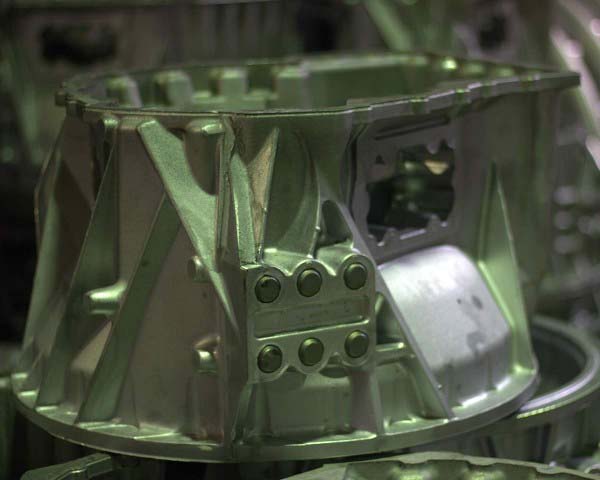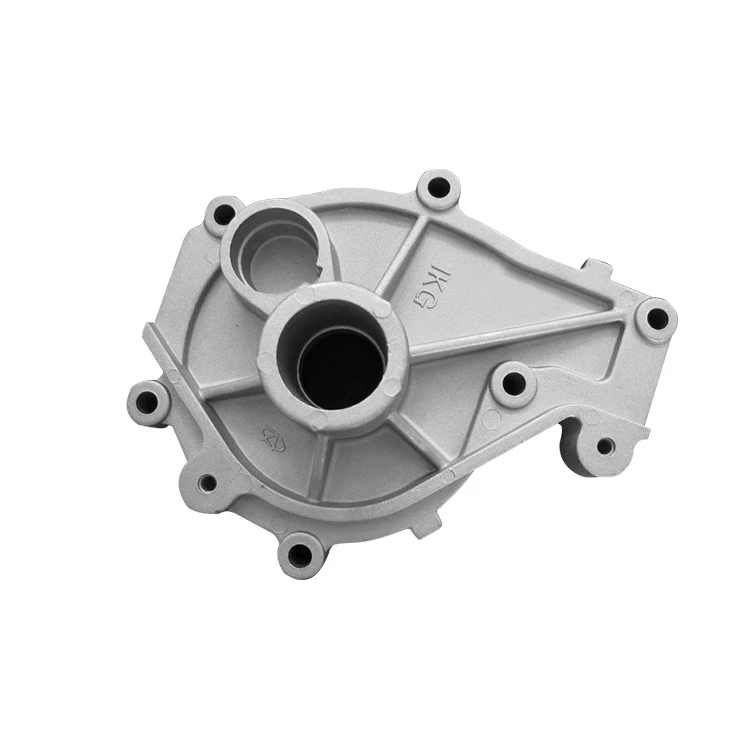Exactly How Aluminum Spreading Contributes to Reliable Production Solutions
Aluminum casting plays a necessary role in modern-day production. Its light-weight nature and corrosion resistance make it a favored option for various sectors. Strategies such as die casting and sand casting permit the creation of complex parts with minimal waste. The integration of automation additional improves production effectiveness. The effects of these developments expand past mere efficiency - Aluminum Casting Company. Understanding the more comprehensive impact exposes significant understandings right into the future of manufacturing
The Benefits of Light Weight Aluminum in Production
Different steels are used in production, aluminum stands out due to its one-of-a-kind homes that enhance production efficiency and product performance. Its light-weight nature notably minimizes transport costs and energy requirements in various applications. Light weight aluminum's excellent corrosion resistance warranties durability and toughness, lessening the requirement for frequent replacements and maintenance. This steel can be quickly molded and formed, allowing for versatile style options that satisfy details sector demands. Additionally, light weight aluminum shows remarkable thermal and electrical conductivity, making it a perfect option for applications needing efficient heat dissipation and electrical management. The recyclability of light weight aluminum additionally plays an essential function in lasting production techniques, as it can be reused without shedding its fundamental buildings. In general, the advantages of aluminum in manufacturing bring about set you back financial savings, enhanced product long life, and a decreased environmental impact, making it a favored material in numerous markets.
Secret Light Weight Aluminum Casting Techniques
Aluminum spreading strategies are crucial for creating high-quality elements in numerous producing procedures. The key methods consist of sand spreading, pass away casting, and investment casting. Sand spreading includes producing a mold from sand, which permits complicated shapes and large parts. This technique is usually favored for its cost-effectiveness and flexibility. Pass away spreading, on the various other hand, makes use of high-pressure to inject liquified light weight aluminum into steel molds, leading to exact, uniform components suitable for high-volume manufacturing. Financial investment casting uses remarkable surface area finish and detailed information by utilizing a wax pattern that is disappeared to form the mold and mildew. Each of these techniques has certain applications and benefits, allowing suppliers to select one of the most appropriate technique based on factors like manufacturing quantity, complexity, and product specs. By recognizing these vital methods, makers can improve their manufacturing effectiveness and assure the integrity of their aluminum components.
Influence On Automotive Industry
As the automobile market significantly focuses on lightweight materials to enhance gas efficiency and performance, light weight aluminum spreading has actually emerged as a critical solution. This production process allows car manufacturers to produce intricate elements with decreased weight without endangering structural honesty. By making use of aluminum spreading, producers can develop components such as engine blocks, transmission housings, and suspension components that are not just lighter however also exhibit superb thermal conductivity and deterioration resistance.
The convenience of light weight aluminum casting techniques makes it possible for the production of detailed styles, assisting in advancement in automobile appearances and capability. As automobiles come to be much more highly advanced, the capability to integrate functions like innovative security systems and electrical drivetrains becomes crucial.

Aerospace Applications of Aluminum Casting
Aluminum spreading plays a vital duty in aerospace applications by enabling the production of light-weight architectural parts that enhance gas performance. Furthermore, the accuracy of light weight aluminum casting permits for the creation of intricate engine components, which are crucial for peak efficiency and reliability. This combination of light-weight products and exact design settings aluminum casting as a crucial technology in the aerospace industry.
Lightweight Structural Components
In the quest for improved efficiency and efficiency in aerospace applications, light-weight structural elements have come to be significantly necessary. Aluminum casting plays an essential role in this venture, giving manufacturers with the ability to create parts that are both solid and lightweight. The low density of light weight aluminum permits for considerable weight decreases without compromising structural honesty, which is important for airplane performance and fuel performance. On top of that, aluminum castings can be crafted to satisfy specific layout demands, allowing the production of complicated geometries that traditional production approaches might have a hard time to achieve. This adaptability not only enhances production procedures yet additionally adds to general expense financial savings. As the aerospace market remains to emphasize sustainability, the need for lightweight light weight aluminum components is anticipated to rise, further progressing advancement in manufacturing.
Precision Engine Components
Producers increasingly count on aluminum casting to generate precision engine components for aerospace applications, driven by the material's one-of-a-kind buildings. Aluminum's lightweight nature significantly minimizes general airplane weight, enhancing gas effectiveness and efficiency. Its outstanding corrosion resistance guarantees durability in rough atmospheres, making it suitable for crucial engine parts. Additionally, light weight aluminum spreading permits complex styles and limited tolerances, important for maximizing engine performance and dependability. The spreading procedure likewise sustains automation, making it possible for producers to meet high need while maintaining quality criteria. As aerospace modern technology remains to breakthrough, the role of aluminum spreading in producing precision engine parts will be essential in attaining higher efficiency and technology in airplane layout and capability.
Sustainability and Ecological Benefits
The growing emphasis on sustainability in manufacturing has actually positioned aluminum spreading as a leading service for environmentally aware production. This process makes use of recycled aluminum, which substantially reduces power usage compared to key light weight aluminum production. By leveraging scrap metal, producers can lower their carbon footprint and lessen waste, aligning with worldwide sustainability goals.
Additionally, light weight aluminum spreading generates fewer hazardous exhausts, adding to a cleaner setting. The lightweight nature of aluminum likewise boosts fuel efficiency in transportation applications, even more advertising eco-friendly methods.
Furthermore, the longevity and rust resistance of aluminum cause longer item life-spans, lowering the need for constant substitutes and preserving sources. As industries increasingly focus on sustainable selections, light weight aluminum casting sticks out as an innovative technique that not just meets manufacturing needs yet also supports environmental stewardship. This dedication to sustainability settings light weight aluminum spreading as a pivotal player in the shift towards a greener production landscape.
Cost Performance in Manufacturing
Cost effectiveness is a significant benefit of aluminum spreading, enhancing its sustainability benefits - Aluminum Foundry. The process of aluminum casting enables the manufacturing of intricate forms with minimal waste, which is especially important in a competitive production environment. Making use of aluminum lowers energy costs, as it has a lower melting point compared to other metals, bring about reduced energy consumption during production
Additionally, light weight aluminum's lightweight homes add to decrease shipping and dealing with costs, better enhancing general price efficiency. The toughness and rust resistance of light weight aluminum actors products here also mean that they call for much less upkeep and replacement over time, causing long-term financial savings for manufacturers.
Improvements in casting innovations, such as boosted mold layouts and automation, have streamlined manufacturing procedures, minimizing labor prices and boosting output effectiveness. On the whole, expense effectiveness in aluminum spreading plays an essential duty in enhancing manufacturing procedures and supporting competitive pricing approaches.
Future Patterns in Light Weight Aluminum Spreading
The future of light weight aluminum spreading is significantly formed by improvements in automation and lasting material advancements. Automation innovations are expected to improve efficiency and precision in the spreading process, while sustainable techniques aim to minimize environmental impact. Together, these patterns assure to redefine production requirements and techniques within the aluminum casting industry.
Automation in Light Weight Aluminum Casting
Embracing automation is transforming aluminum spreading procedures, leading the way for improved efficiency and accuracy. Automated systems improve manufacturing by reducing human intervention, decreasing errors, and boosting throughput. Technologies such as robotic arms and computer mathematical control (CNC) equipments allow for exact and regular shaping of aluminum components. Furthermore, wise sensing units monitor different specifications in genuine time, making certain suitable conditions throughout the spreading procedure. This assimilation of automation not only shortens preparations but additionally enhances product quality by preserving tighter resistances. As producers progressively embrace these innovative modern technologies, the light weight aluminum casting industry is readied to experience substantial improvements in operational efficiency, cost-effectiveness, and competition in the global market.
Sustainable Material Innovations

Often Asked Questions
What Sorts Of Aluminum Alloys Are Commonly Made Use Of in Spreading?
Typically utilized light weight aluminum alloys in casting include 356, 380, and 413. These alloys are favored for their exceptional fluidness, stamina, and deterioration resistance, making them ideal for a variety of industrial applications.
Exactly How Does Aluminum Casting Compare to Other Metal Casting Methods?
Light weight aluminum casting usually supplies lower weight, superior corrosion resistance, and better thermal conductivity compared to other metal casting techniques. Additionally, it enables for detailed layouts and faster manufacturing cycles, boosting total manufacturing effectiveness and performance.
What Industries Advantage The Majority Of From Light Weight Aluminum Casting?
The vehicle, aerospace, and electronic devices markets benefit most from aluminum casting. These industries utilize its lightweight, corrosion-resistant residential properties to boost efficiency, minimize fuel usage, and enhance total product efficiency, making light weight aluminum spreading significantly important.
Exist Particular Style Limitations With Light Weight Aluminum Casting?
Yes, light weight aluminum casting has design restrictions, including restrictions on wall density, facility geometry challenges, and possible concerns with accomplishing limited tolerances (aluminum casting). These variables can influence the total stamina and functionality of the end product
Exactly How Is Quality Assurance Maintained in Light Weight Aluminum Casting Processes?
Quality assurance in aluminum casting procedures is maintained with extensive assessments, adherence to standardized treatments, and the usage of sophisticated technologies. Routine monitoring warranties dimensional accuracy, surface area stability, and material consistency throughout production, promoting total reliability.
As the auto market increasingly focuses on light-weight materials to boost gas efficiency and efficiency, aluminum casting has actually emerged as a crucial solution. Light weight aluminum casting plays an essential duty in aerospace applications by allowing the production of lightweight architectural elements that enhance gas performance. Cost performance is a substantial advantage of light weight aluminum casting, enhancing its sustainability benefits. Embracing automation is transforming light weight aluminum casting procedures, leading the way for improved performance and accuracy. Recycled light weight aluminum use has acquired traction, significantly reducing energy intake contrasted to primary aluminum production.